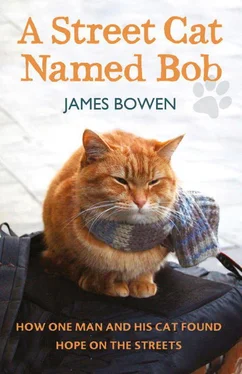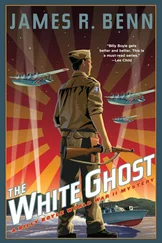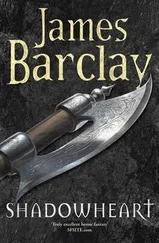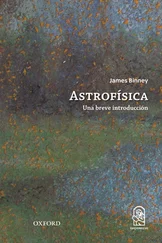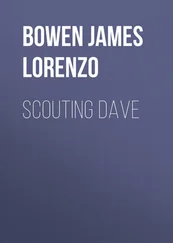‘What are the chances of me getting a good pitch here?’ I asked him.
‘Well, Camden Passage is pretty busy, as is the Green, but you could do outside the tube station if you like,’ he said. ‘No one fancies it much.’
I had a feeling of déjà vu. It was Covent Garden all over again. For other Big Issue sellers in London, tube stations were reckoned to be a complete nightmare, the worst possible places to try and sell the paper. The way the theory went was that people in London are simply moving too fast, they don’t have time to slow down, make the decision to buy one and dip into their pockets. They’ve got to be somewhere else, they are always in a hurry.
As I’d discovered at Covent Garden, however, Bob had the magical ability to slow them down. People would see him and suddenly they weren’t in quite such a rush. It was as if he was providing them with a little bit of light relief, a little bit of warmth and friendliness in their otherwise frantic, impersonal lives. I’m sure a lot of people bought a Big Issue as a thank you for me giving them that little moment. So I was more than happy to take what was supposed to be a ‘difficult’ pitch right outside Angel tube.
We started that same week. I left the Covent Garden vendors to it.
Almost immediately we began to get people slowing down to say hello to Bob. We had soon picked up where we had left off in Covent Garden.
One or two people recognised us.
One evening, a well-dressed lady in a business suit stopped and did a sort of double take.
‘Don’t you two work in Covent Garden?’ she said.
‘Not any more, madam,’ I said with a smile, ‘not any more.’
Chapter 16
Angel Hearts

The move to Angel had definitely met with Bob’s seal of approval; I only had to look at his body language each day as we headed to work.
When we got off the bus at Islington Green, he wouldn’t ask to climb on my shoulders in the way he tended to do when we’d been in central London. Instead, most mornings he would take the lead and march purposefully ahead of me, down Camden Passage, past all the antique stores, cafés, pubs and restaurants, and along towards the end of Islington High Street and the large paved area around the tube station entrance.
Sometimes we’d need to head to the Big Issue coordinator on the north side of the Green, so we’d take a different route. If that was the case, he’d always make a beeline for the enclosed garden area at the heart of the Green. I’d wait and watch while he rummaged around in the overgrowth, sniffing for rodents, birds or any other poor unsuspecting creature upon which he could test his scavenging skills. So far, he’d drawn a blank, but it didn’t seem to dampen his enthusiasm for sticking his head into every nook and cranny in the area.
When we eventually arrived at his favourite spot, facing the flower stall and the newspaper stand near one of the benches by the entrance to the Angel tube station, he would stand there and watch me go through the arrival ritual, placing my bag down on the pavement and putting a copy of the Big Issue in front of it. Once all this was done, he would sit himself down, lick himself clean from the journey and get ready for the day.
I felt the same way about our new stamping ground. After all the trouble I’d had at Covent Garden over the years, Islington seemed like another fresh start for us both. I felt like we were starting a new era, and that this time it was going to last.
The Angel was different from Covent Garden and the streets around the West End in lots of subtle ways. In central London, the streets were mostly crammed with tourists and, in the evenings, West End revellers and theatregoers. The Angel wasn’t quite as busy, but the tube station still saw a mass of humanity pouring in and out each day.
It was a distinctively different type of person, though. There were still a lot of tourists, of course, many of them drawn to the restaurants and arty venues like Sadler’s Wells and the Islington Business Design Centre.
But it was also a more professional and, for want of a better word, more ‘upmarket’ place. Each evening I’d notice hordes of people in business suits heading in and out of the tube station. The bad news was that most of them barely even registered the fact that there was a ginger cat sitting outside the station. The good news was that a large proportion of those who did slow down and spot him took an instant shine to Bob. They were also really generous. I noticed immediately that the average purchase and tip at Islington was just that little bit bigger than in Covent Garden.
The Angel locals were also generous in a different kind of way to those in Covent Garden. Almost as soon as we began selling the Big Issue there, people began giving Bob bits of food.
The first time it happened was on our second or third day. A very smartly dressed lady stopped for a chat. She asked me whether we were going to be there every day from now on, which struck me as a bit suspicious. Was she going to make some sort of complaint? I was completely off the mark, however. The following day she appeared with a small Sainsbury’s bag containing some cat milk and a pouch of Sheba.
‘There you go, Bob,’ she said happily, placing them on the pavement in front of Bob.
‘He’ll probably have that at home tonight if that’s OK,’ I said, thanking her.
‘Of course,’ she said. ‘As long as he enjoys it that’s the main thing.’
After that, more and more locals started donating titbits for him.
Our pitch was down the road from a large Sainsbury’s supermarket. It soon became obvious that people were going in there to do their normal shopping and were picking up a little treat for Bob on their way round. They would then drop their presents off on their way back home.
One day, just a few weeks after we began at Angel, about half a dozen different people did this. By the end of the day, I couldn’t fit all the tins of cat milk, pouches of food and tins of tuna and other fish that had been piling up all day into my rucksack. I had to keep it all in a large Sainsbury’s bag. When I got back to the flat, it filled up an entire shelf in one of the kitchen cupboards. It kept us going for almost a week.
The other thing that was a world apart from Covent Garden was the attitude of the staff at the tube station. At Covent Garden I was the Antichrist, a hate figure almost. I could count the number of people with whom I’d forged a good friendship in the years I’d been busking or selling the Big Issue there on the fingers of one hand. In fact I didn’t even need that. I could think of two at most.
By contrast, the staff at Angel were really warm and generous towards Bob from the very beginning. One day, for instance, the sun had been blazingly hot. The mercury must have been up in the 90s at one point. Everyone was walking around in shirt sleeves even though, technically, it was autumn. I was sweating like crazy in my black jeans and black T-shirt.
I deliberately placed Bob in the shade of the building behind us so that he didn’t get too hot. I knew that heat was bad for cats. An hour or so after we’d set up our pitch, it became clear to me that I’d soon need to get some water for Bob. But before I was able to do something, a figure appeared from inside the tube station with a nice clean, steel bowl brimming with clear water. I recognised the lady immediately. Her name was Davika, one of the ticket attendants, she’d stopped to talk to Bob on numerous occasions already.
Читать дальше
